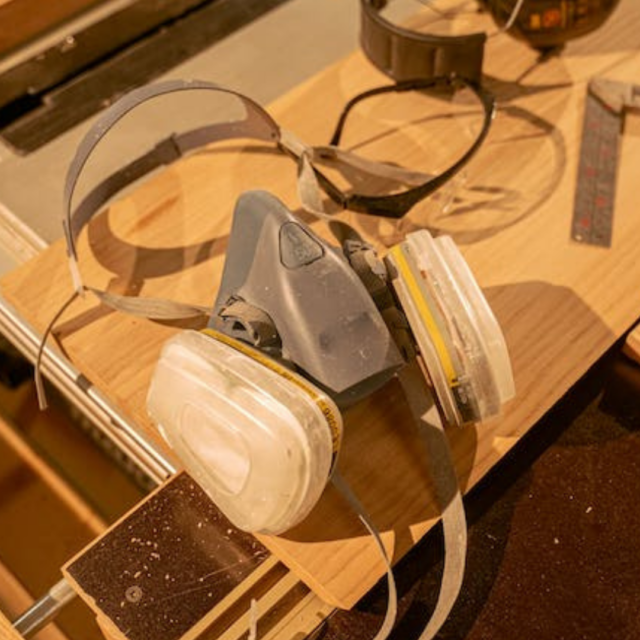Ceiling fixers install suspended ceilings, hide, and protect unsightly materials such as wiring, pipework, heating, and air-conditioning systems. However, working in ceilings spaces can come with several health hazards including heat stress, electric shock, falling through the ceiling, and dust exposure.
Ceiling fixers often work with materials like drywall, plaster, or insulation, which can generate dust and particles that cause harm if inhaled. Dust exposure can pose various risks to their health.
Asbestos
According to the HSE, asbestosis is the single greatest cause of work-related deaths in the UK. But what is asbestos and why is it a danger to ceiling fixers?
Asbestos is the name given to a group of naturally occurring fibrous minerals that are resistant to heat and corrosion. If products containing asbestos are disturbed, tiny asbestos fibres are released into the air. When asbestos fibres are inhaled, they may get trapped in the lungs and remain there for a long time. Working with asbestos present can create long-term health issues if exposed repeatedly or for long periods of time. Asbestos-related diseases usually happen 20-50 years after exposure.
Signs and symptoms of asbestosis may include:
- Shortness of breath
- A persistent, dry cough
- Chest tightness or pain
- Dry and crackling sounds in your lungs when you inhale
- Clubbing of fingertips and toes.
Asbestos-related diseases:
- Asbestosis is a chronic (long-term) lung condition. There is no cure for asbestosis once it has developed, as it’s not possible to reverse the damage to the lungs. However, there are some treatments available to help with the symptoms.
- Pleural disease is a non-cancerous condition that causes changes in the membrane surrounding the lungs and chest cavity.
- Mesothelioma is a type of cancer that develops in the lining that covers the outer surface of some of the body’s organs.
Silicosis
Silica dust can be generated when cutting or sanding materials like drywall or concrete. Prolonged exposure to silica dust is associated with respiratory diseases such as silicosis, lung cancer, and other lung disorders. Silicosis can also increase the risk of getting other serious conditions such as tuberculosis, kidney damage, chest infections and emphysema.
Symptoms of Silicosis:
- Shortness of breath
- Chest pain
- A harsh, dry cough
- Tiredness
Face Fit Testing
In a role where you're required to wear Respiratory Protective Equipment, it is crucial to undergo a face fit test. Face fit testing is a method used to ensure a tight-fitting respirator is sealing against the wearers face to significantly reduce their exposure to any airborne hazard. As we do not all have the same shape and sized face, we cannot assume a mask is providing adequate protection unless it has undergone a face fit test.
The different methods:
Qualitative fit testing is a pass/fail test based on the wearer’s subjective assessment of any leakage through the face seal region by detecting the introduction of bitter-or sweet-tasting aerosol as the test agent. The Qualitative method is suitable for disposable and reusable half masks, they are not suitable for full-face mask. At Cavity, we offer a fit test service for all FFP3 masks.
Quantitative fit testing is the process to measure the precise amount of leakage into any tight-fitting facepieces. A machine (Porta Count) calculates measurements instead of relying on bitter-tasting chemicals and your senses. The reading on the porta count machine will determine if the mask has an adequate seal with the wearer’s face. At Cavity we also offer this service for disposable, half face respirator’s and full face masks.
Choosing the correct respirator for ceiling fixers
- Disposable Particulate Respirators: If the primary concern for ceiling fixers is dust and airborne particles, disposable particulate respirators can be suitable. These respirators provide protection against solid particulates but do not protect against gases or vapours.
- Half-Face Respirators: If ceiling fixers are exposed to more significant airborne hazards such as chemicals or fumes, half-face respirators can be appropriate. These respirators cover the nose and mouth and use replaceable cartridges or filters to provide protection against specific contaminants.
- Full-Face Respirators: If the work environment poses hazards to the eyes or requires additional protection for the face such as chemicals or particulates, full-face respirators can provide comprehensive coverage. These respirators protect the eyes, nose, mouth, and respiratory system.
What to do before a fit test?
Before your fit test, you must follow the procedures:
- Don’t eat or drink within 30 minutes of the fit test (excluding unflavoured water)
- Don’t chew gum, smoke, or vape within 30 minutes of the fit test
- Bring some form of photographic ID with you
- Within the last 8 hours, ensure the mask seal area has been clean – shaven
- Remove any make-up within the mask seal
- Have long hair tied back and out of the way
- Bring any head worn personal protective equipment that you wear with your mask
- Bring glasses if you wear them with your mask.
Face fit testing is crucial for ceiling fixers as they are exposed to many harmful chemicals, substances, and particles. It is so important the respiratory protective equipment you are using has a tight seal and is providing adequate protection.
Stay protected!
For more information, please get in touch by emailing enquiries@cavity-fit-test.co.uk or give us a call on 0118 214 6192.
